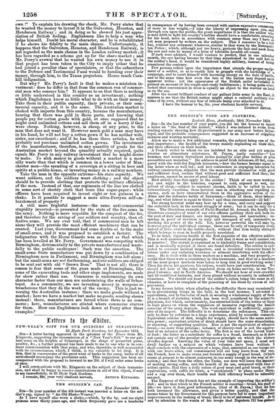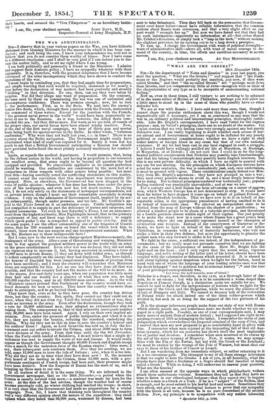THE SOLDIER'S FOOD AND CLOTHING.
Lesketh How, Ambleside, 28th November 1854. Sin—In the last number of your paper, you did me the honour to insert a letter on " the food of the soldier," which I was induced to write from reading reports showing how ill-provisioned is our army now before Sebas- topol, and the probable consequences suggested in an increase of crippling sickness and wasting mortality.
Allow me to make a few additional remarks, the subject being one of the first importance ; the health of the troops mainly depending on their diet, and their efficiency on their health. A French writer to whom we are indebted for an able and yet concise treatise on alimentary substances, M. Payen, justly remarks—" Les hommes mal nourris travaillent moins puisqu'ils sont plus faibles et plus accessibles aux maladies." He adducts in proof Irish labourers, ill fed, com- pared with the well-fed English labourers,—how the former become equal to the latter when as well fed ; and how contractors in engaging labourers for railway construction, stipulate that the men provide themselves with good and sufficient food, certain that without good and sufficient food they, the employers, cannot be secure of good labour. How strictly does thie apply to the soldier ! Think of our men working day and nigbt in the trenches exposed to cold, exposed to wet, de- prived of sleep,—subject to constant alarms, liable to be called to make extraordinary exertions, those heroical ones in attacking and repelling an enemy, such as have immortalized them in the aggressive action of the Alma and the defensive battle of Inkerman —think of them, thus labour- ing, and what labour is equal to theirs ? and thus circumstanced—ill fa!
The strong heroical mind may bear up for a time, and carry and support the enfeebled body in the mortal struggle of arms ; but it can be only for a time. The illustrious example of Field-Marshal St. Arnaud, the hardly less illustrious 'examples of some of our own officers quitting their sick beds for the post of duty and danger, are inspiring instances, and instructive ; in- spiring in proof of devotion to duty and disregard of self, instructive as marking the power of the will. Yet, however powerful the will may be, however great the individual courage, these can be only of temporary avail, indeed of little avail in the battle-shock, without that firm bodily strength which belongs to man in health properly nourished.
To be brief, vigorous health is the first requisite of the effective soldier. This is well understood in principle. Would that it were as well carried out in practice! The recruit is examined as to his bodily frame and constitution, and is medically rejected if these are found defective. The soldier is sub- jected to constant medical inspection, and is invalided whenever found to labour under any enduring weakness or ailment interfering with his effieV ency. He is dealt with in these matters as a machine, and very properly,— would that there were a consistency in this treatment, and that as a machine all the most proper methods were taken to keep him in good working order ! Then his dress, his quarters, his rations, would have just consideration. We should not hear of the same regulated dress on home service, in our Tro- pical Colonies, and in North America. We should not hear of over-crowded and ill-ventilated barracks, and these placed without necessity in unhealthy situations. We should not hear of the soldier's ration being the same in all climates, or have to complain of the poisoning of his blood by excess of salt provisions. In my former letter, when alluding to the difficulty there may occasionally be in provisioning troops in the field, in the best manner, I adverted to equivalents, and to the value of such in securing a wholesome supply of food. It is a branch of dietetics which has been well considered by the scientific physician, but which, unfortunately, has attracted little of the notice of those in high places on whom the regulation of measures regarding the health concerns of the army depends. The word equivalent is sufficiently expres- sive of its import. The difficulty is to determine the substances. This can only be done by reference to a large experience, aided by scientific research. Equivalent articles of diet, weight for weight, should have the same nutri- tive power ; equivalent articles of drink should have the same stimulating, or cheering, or supporting qualities. Rice is not the equivalent of wheaten bread,—no more than potatoes; infusion of chicory-root is not the uira- lent of an infusion of the coffee-berry. The first is one of the lowest kinds of food ; the latter as a substitute for coffee is a fraud, inasmuch as it does not contain any of the peculiar nitrogenous principle on which the virtues of coffee depend. Knowing the value of your time and space, I must not dwell further on a subject on which volumes, have been written. I shall conclude with the expression of a hope, that, assbciated as our troops are with our brave allies, our commissariat will ere long learn from the one, the French, how to make ovens and furnish a supply of good bread, (which seems at present to be almost unknown in our army except in the way of do- nation,) and that from the other, the Turks, our men will learn the Jammer of making strong coffee, and the benefit of its use, compared with that of ardent spirits. Had they a daily ration of good meat and good bread, or their equivalents with coffee for drink, a "mackintosh" to place under them, and a rug over them, their health and field efficiency would be tolerably secured.
The Emperor of the French has set the example of improving the soldier's diet ; and in that which to the French soldier is essential—bread, his staff of life—we have it from good information, (that of M. Payea,) that he bas both increased the allowance, and given a better quality, and that the means taken by his Government far this purpose have led to some important improvements in the making of bread, likely to beef universal benefit. Is it not by attention to the wants of his troops that Napoleon III has gained tbeirhearts, and secured the "Viva l'Empereur " as an hereditary battle- cry ?



































 Previous page
Previous page